“New World-Configuration & Cross-Strait Relations---the Progress of Peace and Cooperation”, the 13th session of the Symposium of
There were four sub-programs of this meeting: the peaceful development of Cross-Strait relations and new world-configuration, Hu"s six-point proposal and the peaceful development of Cross-Strait relations, Taiwan’s local political, economic and social environment for the peaceful development of Cross- Strait relations, and the framework & path of the peaceful development of Cross-Strait relations. Scholars from International Studies Institute of Tamkang University included professors Wang Gaocheng, Pisarev, Chen Yixin, Xiong Jiancheng, associate professors Zhang Wuyue, professor Guo Qiuqing, professor Pan Xitang, assistant professor Lin Qinming, those from SIIS included senior researchers Yan Anlin, Wu Ji’nan, Li Xiushi, Guo Longlong, Zhao Nianyu, associate researcher Wu Chunsi, and assistant researchers Shao Yuqun, Wang Ru and Zhang Zhexin and those from other institutes and universities in Shanghai included professors Zhu Weilei, Cao Jingxing, Lin Gang, Sheng Jiuyuan and Bao Chengke, vice inspector Li Leiming and Miss Lu Hongmei of Shanghai’s Taiwan Affairs Office.
Scholars across the Strait had a frank and in-depth discussion chaired by Yan Anlin, Executive Director of Institute for Taiwan, Hongkong & Macao Studies (SIIS), and Dai Wanqin, Vice President of Tamkang University. They held that Ma Yingjiu’s coming into power and Kuo Mingtang’s getting back in government create a precious opportunity for the peaceful development of Cross-Strait relations, and the international environment is favorable for the development of Cross-Strait relations since the major powers are all pleased to see the peaceful development of Cross-Strait relations. Given the peace-dividend effect brought about by the peaceful development of Cross-Strait relations, the mainstream opinion of Taiwan people to support the peaceful development of Cross-Strait relations will be further consolidated, despite the constraint of the oppositional Democratic Progressive Party. Hu’s Six- Point Proposal not only serves the framework document of mainland’s policy toward Taiwan, but also footnotes the roadmap for peaceful development of Cross-Strait relations. Thanks to the joint efforts made by both sides across the Strait, the trend of the peaceful development of Cross- Strait relations has been formed and great accomplishment has been achieved by three rounds of Chiang-Chen Talks. Both sides should seize this opportunity to further promote and consolidate the peaceful development of Cross-Strait relations the peaceful development despite challenges.
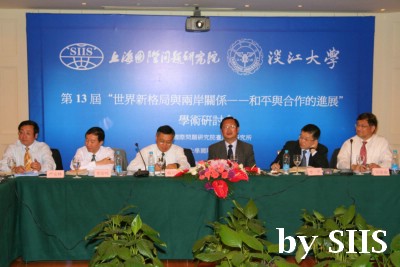
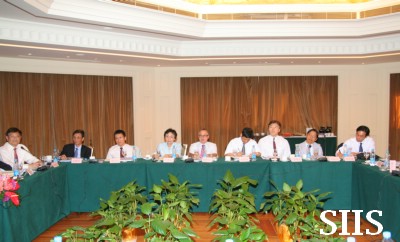
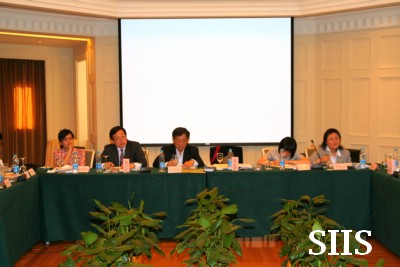
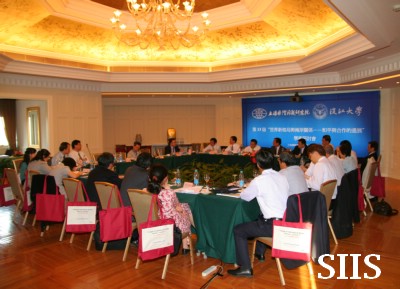
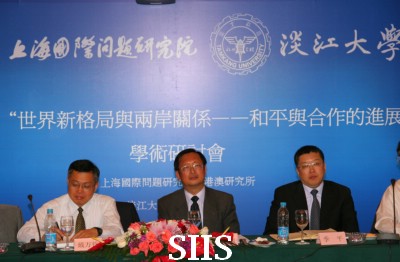
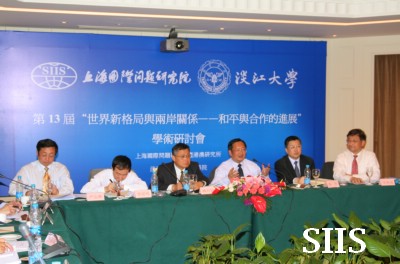
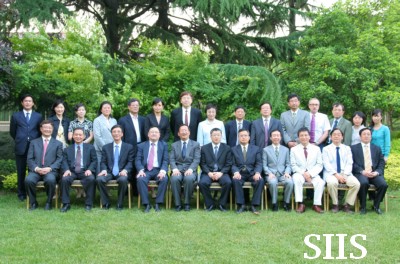
2016/09/10 read:616
Shanghai Institutes for International Studies (SIIS) and International Studies Institute of Tamkang University co-held symposium entitled “New World-Configuration & Cross-Strait Relations---the Progress of Peace and Cooperation”, the 13th session of the Symposium of Cross-Strait Relations. SIIS President Yang Jiemian, Vice President of Tamkang University Dai Wanqin, Deputy Director of Shanghai-based Taiwan Affairs Office Ji Ping attended and presided the meeting.
There were four sub-programs of this meeting: the peaceful development of Cross-Strait relations and new world-configuration, Hu"s six-point proposal and the peaceful development of Cross-Strait relations, Taiwan’s local political, economic and social environment for the peaceful development of Cross- Strait relations, and the framework & path of the peaceful development of Cross-Strait relations. Scholars from International Studies Institute of Tamkang University included professors Wang Gaocheng, Pisarev, Chen Yixin, Xiong Jiancheng, associate professors Zhang Wuyue, professor Guo Qiuqing, professor Pan Xitang, assistant professor Lin Qinming, those from SIIS included senior researchers Yan Anlin, Wu Ji’nan, Li Xiushi, Guo Longlong, Zhao Nianyu, associate researcher Wu Chunsi, and assistant researchers Shao Yuqun, Wang Ru and Zhang Zhexin and those from other institutes and universities in Shanghai included professors Zhu Weilei, Cao Jingxing, Lin Gang, Sheng Jiuyuan and Bao Chengke, vice inspector Li Leiming and Miss Lu Hongmei of Shanghai’s Taiwan Affairs Office.
Scholars across the Strait had a frank and in-depth discussion chaired by Yan Anlin, Executive Director of Institute for Taiwan, Hongkong & Macao Studies (SIIS), and Dai Wanqin, Vice President of Tamkang University. They held that Ma Yingjiu’s coming into power and Kuo Mingtang’s getting back in government create a precious opportunity for the peaceful development of Cross-Strait relations, and the international environment is favorable for the development of Cross-Strait relations since the major powers are all pleased to see the peaceful development of Cross-Strait relations. Given the peace-dividend effect brought about by the peaceful development of Cross-Strait relations, the mainstream opinion of Taiwan people to support the peaceful development of Cross-Strait relations will be further consolidated, despite the constraint of the oppositional Democratic Progressive Party. Hu’s Six- Point Proposal not only serves the framework document of mainland’s policy toward Taiwan, but also footnotes the roadmap for peaceful development of Cross-Strait relations. Thanks to the joint efforts made by both sides across the Strait, the trend of the peaceful development of Cross- Strait relations has been formed and great accomplishment has been achieved by three rounds of Chiang-Chen Talks. Both sides should seize this opportunity to further promote and consolidate the peaceful development of Cross-Strait relations the peaceful development despite challenges.







